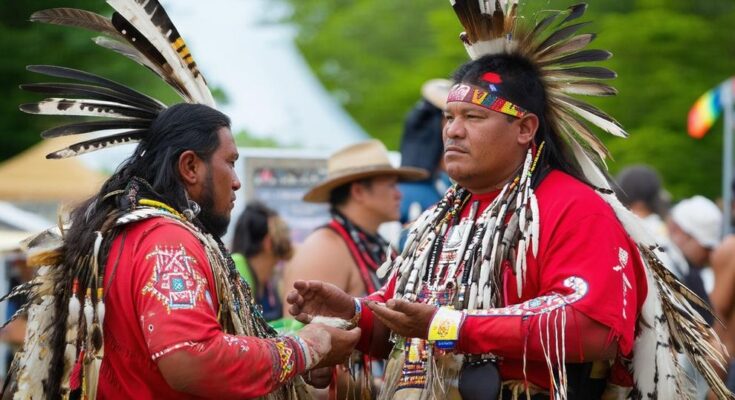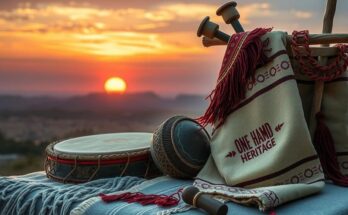First Nations tourism operators are increasingly meeting demand for cultural experiences, but many face significant challenges. A recent report recommends forming a dedicated Indigenous tourism body in Australia to support operators and grow this sector. Dale Mundraby’s Mandingalbay Authentic Indigenous Tours exemplifies the success and obstacles faced by Indigenous enterprises. Experts assert better support could unlock substantial opportunities, recognizing Indigenous culture as a central offering in Australian tourism.
In Australia, tourism operators from First Nations communities are increasingly sharing their rich cultural heritage with growing numbers of interested travelers. Yet, many face obstacles in establishing their businesses, as highlighted by a recent report advocating for a dedicated Indigenous tourism body. As the demand for authentic cultural experiences rises, support for operators is crucial for sustainable growth. Dale Mundraby, from the Mundraby family, has turned his childhood stories into a successful venture, leading Mandingalbay Authentic Indigenous Tours. Drawing from the wisdom of Yarrabah elders, he aims to preserve and share First Nations culture through immersive experiences. “Storytelling was our TV,” he reminisces, emphasizing the importance of community empowerment and education for visitors. Despite his success, Mundraby faced skepticism within the wider tourism sector. Comments like, “good luck with that,” reflected the challenges of gaining recognition for Indigenous contributions. He has navigated complex conversations with government entities to inspire economic opportunities that uplift Aboriginal communities. Reports indicate many Indigenous tourism operators share this sentiment, with a parliamentary inquiry uncovering systemic challenges post-COVID. The inquiry recommended the formation of a First Nations tourism body to support operators by providing access to funding and resources, modeled after the successful WAITOC in Western Australia. According to WAITOC CEO Robert Taylor, the absence of intergenerational wealth complicates financial backing for Indigenous businesses. He urges for a national organization to foster diverse Aboriginal experiences, helping international visitors understand Australia’s unique cultural landscape. Tourism Australia has been proactive, incorporating First Nations initiatives like the “Come and Say G’day” campaign while appointing Indigenous representative Georgina Richters to their board. But experts assert that a distinct First Nations tourism body could elevate Indigenous operators from niche sectors to key players in the industry, realizing untapped potential. At the heart of this movement is a profound appreciation for Indigenous culture, highlighted by UQ expert Lisa Ruhanen, who notes its unparalleled significance. Offering experiences exclusive to Australia, it has historically been undervalued, yet is crucial for connecting tourists with the land’s ancient wisdom and beauty. Visitors to Mundraby’s tours discover the powerful stories of the land, shared by passionate guides like Joanne Mundraby, who believes her work transcends tourism. “It’s about honoring our elders,” she affirms, merging cultural pride with opportunity for future generations. This unity fosters a stronger sense of identity and connection for both guides and tourists. Travelers like Beverly Milo from Florida relish these unique experiences that offer glimpses into Indigenous lives and customs, which often starkly contrast their own. Barbara Bondy-Pare, a visiting Canadian, actively seeks First Nations experiences around the globe, underscoring the global fascination with Indigenous cultures and their narratives.
The growth of Indigenous tourism in Australia highlights a vibrant opportunity for First Nations communities to share their unique cultures while simultaneously addressing economic challenges. Despite the rising international interest in cultural experiences, operators face significant barriers that hinder their ability to thrive. A recent parliamentary inquiry emphasized the need for a structured support system, suggesting the establishment of a dedicated Indigenous tourism body, reflecting the sentiments of many experienced operators who have endured skepticism and operational hurdles.
First Nations tourism operators play a vital role in showcasing the diverse and rich tapestry of Indigenous culture to the world. The establishment of a dedicated Indigenous tourism body could provide essential support to foster economic growth and cultural preservation within these communities. As traveler interest continues to surge, it becomes imperative to recognize and facilitate the challenges faced by these operators, ultimately enriching the broader tourism landscape in Australia.
Original Source: www.abc.net.au



